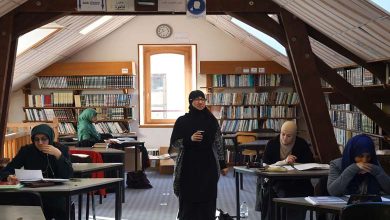20 years after the law on secularism in French schools, the debate is not subsiding
A specialist in secularism says that "the administrative staff of French schools had to deal with issues related to the wearing of the hijab almost every day"

On March 15, 2004, the prohibition of religious symbols or wearing clothes that show religious affiliation in schools was enshrined in French law to clarify the issue of secularism, but the situation remains unclear after 20 years.
This issue arose in 1989 with the Kheri case in the suburbs of Paris, when three girls were excluded from school for wearing the hijab, sparking intense debate in France about secularism.
After years of efforts, President Jacques Chirac tasked a committee of wise men with the dossier in the summer of 2003. The latter recommended the adoption of a law prohibiting “the wearing of signs or clothing that ostentatiously manifest students’ religious affiliation”, such as veils, crosses, and kippas.
After 20 years, “the law has achieved its objective in purely quantitative terms,” according to Ismaël Farhat, a secularism specialist and lecturer at the University of Nanterre (Paris suburb), who asserts that “violations of the principle of secularism related to clothing remain relatively limited”.
This is the general impression of several school principals. Kamel Aït Bouali, director of the Paul Bert school complex in Paris and a union representative, says there is “a before and after the law of March 2004” and reveals that “the administrative staff of schools had to deal with issues related to the wearing of the veil almost every day”.
Kamel Aït Bouali, who served as director of a school in the Seine-Saint-Denis region (Paris suburb), says that “the 2004 law clarified the situation”, even if “some students only remove their veil in the immediate vicinity of the establishment with some provocation, but the situation is no longer as it used to be”.
Florence Delanoë, director of the Montebello school in Lille (north), acknowledges that “the law was indispensable at the time to allow us to regain some serenity,” noting that “it was the case”.
She believes that the decision to ban the wearing of the abaya before the start of the 2023 school year, made by the then Minister of Education Gabriel Attal, also provided relief in a context where attempts to circumvent the 2004 law were relatively widespread.
The increase in abayas in educational institutions from the spring of 2022 constitutes, according to Yannis Roudier, director of the education observatory at the Jean-Jaurès Foundation, a widespread attempt to circumvent the 2004 law, but this law remains, even if it is sometimes misunderstood and secularism in schools is often questioned.
Gabriel Attal, now Prime Minister, believes that secularism in schools is “threatened”… “more than ever probably today,” especially with “the increase in complaints against education”.
Recent studies show that French Muslim youth view secularism with suspicion. According to researcher Ismaël Farhat, “the conclusions of studies and surveys converge to show” that young people are “the least favorable or the least supportive of the 2004 law”, with a much stronger rejection among young people from disadvantaged neighborhoods, vocational schools, and those of Islamic culture”.
These are often those who have experienced “the most negative experience at school”, a phenomenon “which reflects on the issue of secularism”, as “some Muslims still consider themselves always likely to be stigmatized and targeted,” according to Farhat.
Shahd (17), a high school student in Seine-Saint-Denis, says: “We accept the law against our will,” considering it “unfair” to have to remove her veil when she sees around her “some girls wearing crosses”. Her classmate Hakima reveals: “I feel excluded. And I don’t understand the meaning of secularism. It only applies to veiled women”.
From the start, “some Muslims viewed the law as hostile to their religion. This is still the case today for them,” according to Samia Langar, responsible for secularism at Lyon 2 University, in eastern-central France.












